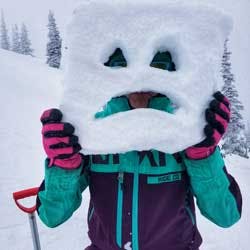Crusts are hard layers of snow usually created by liquid freezing on or near the snow surface. They can also result from strong winds.
Crusts can act as a firm bed surface for slab avalanches after they are buried in the snowpack. The presence of a weak layer on the crust can contribute to the likelihood of slab avalanches. If a crust is strong enough to support the weight of a person or machine, it may reduce the chance of triggering the weak layers beneath it.
Types of crust include:
Melt-freeze crust
- Caused by surface snow melting and then refreezing as a result of warm air temperature.
Rain crust
- A crust caused by rain falling on the snow surface and freezing.
- Can form anywhere rain falls and, unlike sun crusts, it can form on all aspects.
- Forms as a thin, breakable crust on the snow surface.
Sun crust
- A crust resulting from solar radiation.
- Unlike rain crusts, sun crusts are limited to sun-exposed slopes.
- Can form in below-freezing air temperatures by heat from the sun melting the snow.
- It generally results in a thin, breakable crust on the snow surface.
Wind crust
- Caused by the wind compacting snow into a hard surface.
